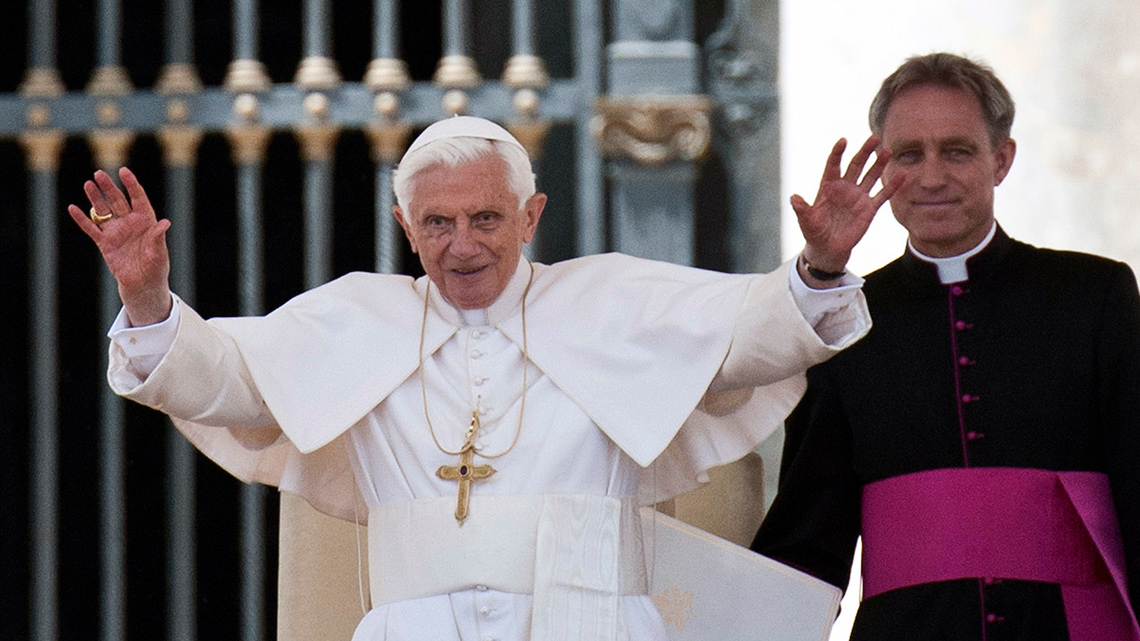
As the late Pope Emeritus Benedict XVI lies in state in St. Peter’s Basilica, Vatican News takes a look back over the nearly eight years of his papacy, starting with the choice of his pontifical name through to his shock resignation.
It was the afternoon of 19 March 2005 when white smoke billowed out of the Sistine Chapel chimney to announce the election of a new Pope.
Moments later the bells of St Peter’s pealed loudly in celebration. And the people of Rome heard and flocked to the square in great numbers only just in time to hear the customary announcement ‘We have a new pope,’ in Latin.
When they heard the name, Joseph and then Ratzinger, they cheered. They immediately recognised a prominent and familiar figure in the Catholic Church. After all he had been one of the late John Paul II’s closest advisors for over two decades.
And when the new Successor of Peter appeared at the central balcony of the Basilica in his white cassock, following in the footsteps of his predecessor who had broken new ground in this respect, he addressed the crowds: “After the great Pope John Paul II,” he said, “the Cardinals have elected me, a simple and humble labourer in the vineyard of the Lord.”
But the real surprise came when he announced he would take the name ‘Benedict’. The last Successor of Peter to take that name had been elected in 1914.
Austrian Cardinal Christoph Schӧnborn, one of the Cardinals to elect him explains:
“It was evidently a signal… he drew inspiration from Benedict XV, a pope who pursued peace at a time of war and from a monk Saint Benedict, patron Saint of Europe.”
Who exactly was this German-born Pope?
He was born at Marktl am Inn, a small town of Upper Bavaria on the Austrian border on 16 April 1927.
His university years had been taken up with philosophical and theological studies from 1946 to 1951, and ended with a doctoral dissertation centred around the notion of the people of God in Saint Augustine and a post-doctoral work on Saint Bonaventure, a Franciscan theologian from the thirteenth century.
His theological qualifications led to a teaching position at the University of Bonn, until he was called to Rome in 1962 to attend the Second Vatican Council as an expert.
When the Council ended in 1965, he went back to Germany, once again to teach, this time at the University of Tübingen.
Then, in 1977, Pope Paul VI appointed him Archbishop of Munich. Later, in 1981, Pope John Paul II appointed him as Prefect of the then-Congregation for the Doctrine of the Faith (CDF), a position he held for over two decades until his election to the papacy.
It was during these latter years as Prefect of the CDF that he became a familiar figure in Vatican circles, in a special way at Vatican Radio, where he crossed the threshold many times.
The future Benedict XVI joined us in our studios first as cardinal to offer us a self-portrait, saying:
“All I can say is I come from a very simple and humble family, and I don’t really feel like a cardinal. In Germany I lived in a small town… and there I feel at home.”
And then later as Pope, when less than a year into his pontificate he was back at his radio station once again.
It was 3 March 2006, and this time his words were of encouragement:
“To help build this great family that knows no frontiers, in which we are all brothers and sisters in the multiplicity of cultures and languages and thus constitute a peace-making force.”
Certainly, if one had to identify the legacy of Benedict XVI, his extraordinary ability with words both in print and in the spoken form would come to mind.
Starting from his homily during Holy Mass to mark the beginning of his Petrine Ministry, on 24 April 2005:
“The Pastor must be inspired by Christ’s holy zeal: for him it is not a matter of indifference that so many people are living in a desert. And there are so many kinds of deserts. There is the desert of poverty, the desert of hunger and thirst, of abandonment, of loneliness, of destroyed love… The Church and all her pastors, like Christ, must set out to lead people out of the desert.”
Then beyond his moving homilies, there were his addresses during the weekly General Audiences and the many speeches he delivered in the public square on Apostolic Journeys. Those to English-speaking countries stand out: the United States, Australia, and the United Kingdom.
And in the written word there were many documents and three encyclicals: Deus Caritas Est (God is Love) in 2005; Spe Salvi (Saved in Hope) in 2007; Caritas in Veritate (Charity in Truth) in 2009; and also publications, to quote but one: the well-known ‘Jesus of Nazareth’ trilogy.
But this gentle, scholarly Pope also had his share of battles during the eight-year pontificate.
He had to deal with scandals both from within the Vatican with the leaking of documents and, from without, with the clerical sexual abuse issue.
He responded decisively to these scandals, becoming a promoter of justice and child protection.
However, the gesture that most astonished the world was Benedict XVI’s resignation.
It took place on 28 February 2013, and left the world in shock. No Roman Pontiff had done this for almost six centuries.
Since that day he became known as Pope Emeritus Benedict XVI. And in the twilight years of his life, he retired within the Vatican walls, continuing to write, and leading a quiet life of prayer and meditation, until his death on 31 December 2022.
Source: Vatican News